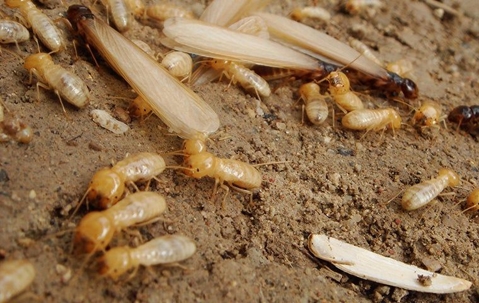The term “termite season” can seem pretty daunting, especially due to the fact that these tiny wood-eating pests cost US homeowners 5 billion dollars on average each year. If your home is even partly made out of wood, it could be at risk. We are here today to help you evaluate this risk and to determine what termite season could mean for your property this year. Let's jump right in.
What Are Termites?
Termites are social insects that live in colonies, usually deep underground. Here in Evansville, the most common species of termite is the subterranean termite. These wood-hungry pests will build their nests beneath the ground near structures of wood. This could be anything from a rotting tree out in the forest to your garage or house. Once a termite nest has been established near a source of wood, termite workers will tunnel to it and begin to harvest from it. Once food has been gathered they will bring it back to their colony to feed their kings and queens who will then, in turn, make more termites. This cycle continues until all gatherable sources of food are gone.
What Is Termite Season?
Although most termites reside deep underground, there is one type of termite that can be found above the surface. They are called termite swarmers. These reproductive winged termites are spawned from fully mature termite colonies and given the job of finding new places to build nests. This is how most termite infestations start.
If you are seeing what looks like black flying ants with white wings outside your Evansville home, we have some bad news for you. Those are termite swarmers, and they are currently checking your home to see if it is a viable source of food. Swarmers being found inside your home are an even worse sign as they most likely are an indication of a preexisting termite infestation, meaning your home is already under attack.
What Factors Attract Termites
The good news is that subterranean termites typically will not eat just any kind of wood. They prefer wood that has been softened by water damage, rot, or decay. If your home was made within the past year, chances are it is not at risk of a termite infestation as its wood has been recently treated and most likely has not yet had a chance to become softened. If your home is more than a few years old, however, it could be at risk of a termite infestation. Things you can do to determine your home’s risk involve looking for damaged wood and investigating for any factors such as water build-up, leaks, or rot that could be making your home more attractive to termites.
How You Can Reduce Your Risk Of Termites
To reduce factors that attract termites, address issues that are or could be attributing to the problem. This can be done in a few ways.
- Fix leaks around your home.
- Make sure your gutters are working properly.
- Eliminate sources of water build-up.
- Trim back bushes and trees around your home to allow sunlight on your home’s exterior to keep things dry.
- Avoid using wood-based mulch near your home.
- Repair or replace water-damaged or softened wood around your home.
The Best Way To Defend Your Home Against Termites
At the end of the day, the only sure way to deal with termites is with professional termite control. Our team here at Action Pest Control is equipped with the treatments and strategies needed to get and keep any home termite-free. If you suspect your home has a termite problem or would like to ensure it never will, we are here to help.
Reach out to us today to find the best home pest control services in Evansville.

